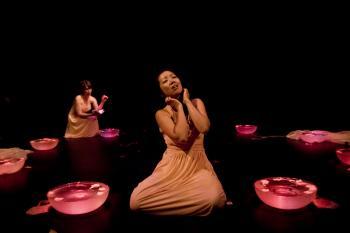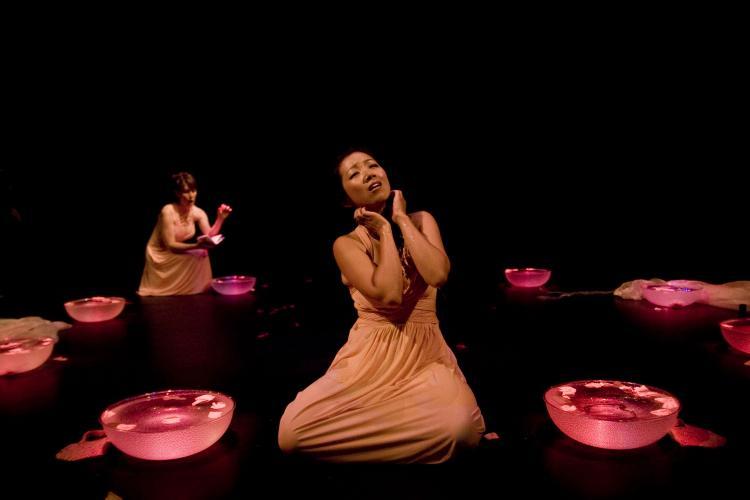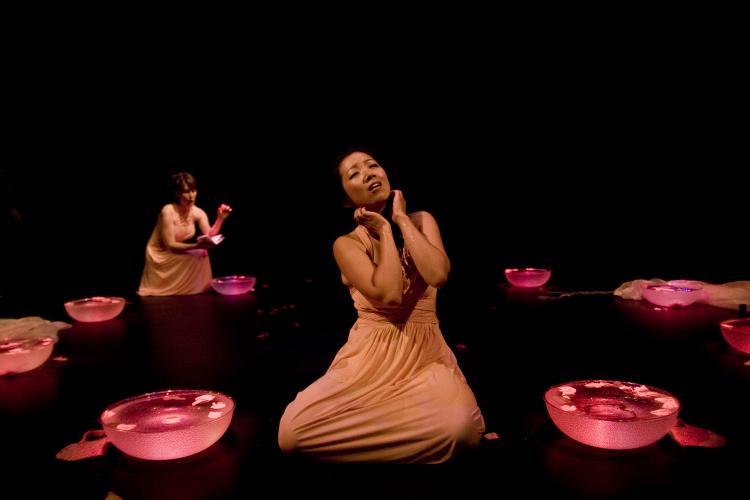Queen of Puddings Music Theatre had a great idea. “Beauty Dissolves in a Brief Hour” presents three newly composed chamber operas united by the all-pervading subject of love. Texts for the musical triptych are drawn from the histories of Medieval France, Tang Dynasty China, and Baroque Italy.
Now add mezzo-soprano Krisztina Szabó, Soprano Xin Wang, and John Lettieri wearing his accordion, and how clever! The whole show was about 50 minutes—a brief hour indeed.
We expected something intimate, the bare elements revealing the beauty of the poetry. The contrast of different texts and compositional styles seemed of great promise to me. In my opinion Krisztina Szabó is a brilliant musician. She was fantastic as Idamante in the COC’s Idomeneo this year. I was looking forward to hearing her again, and in a seat so close we could get spit on. Really, it brings out the hockey fan in me.
As I took my seat and the lights came up I took note of Michael Gianfrancesco’s costumes and set. They were simple, effective, and suited the mood and text. The stage was set for success.
First came medieval literary superstar and single mom Christine de Pisan’s “Jeux à Vendre.” Next, a setting of one of the two surviving works of Tang Dynasty poet Zhang Ruoxu “Spring, River and Flowers on a Moonlit Night.” Finally, “Beauty Dissolves in a Brief Hour,” sourced from a song by the 17th century’s foremost Italian madrigal composer Barbara Strozzi. It was presented in English for the eponymous production.
It was no surprise that the performers were brilliant. Szabó and Xin emoted in perfect measure and stayed connected, giving riveting performances as they carefully and intently delivered the disjointed, cobbled together music. Good singers, a good accordion player, a meticulous conductor, and a nice set, but the compositions were, well, lacking.
Pierre Klanac’s “Jeux à Vendre” was a hard sell. Minimal melodic contours and hocketed verses were interesting at first but became repetitive. Single ugly notes from the accordion incomprehensively peppered circular-sung phrases, only to interject sour chords later. The lack of harmonic support created pitchy moments for the singers. And then the anti-ending—the wheezing bellows of the accordion. It was the overall quality of the singing that kept me in my seat.
Fuhong Shi’s setting of “Spring, River, and Flowers on a Moonlit Night” seemed like the antithesis of the poem’s imagery. The “prepared accordion” presented a complete menagerie of every hideous sound you can squeeze out of a squeezebox with dissonant shrieking over top. There was one single discernable phrase somewhere in the middle.
Chinese is a beautiful language when sung. Successful marriage of Eastern and Western styles are increasingly common. But Shi’s piece was noise. Each possible phrase was collapsed as if under the influence of a vacuum. It was post-modern in a post-post modern era. Let’s move on.
John Rea’s “Beauty Dissolves in a Brief Hour” presented us with the only redeemable moments especially for our accordion player. Simultaneous extended trills by both voices and accordion provided interest. Runs of altered scales actually related to what the singers were doing gave a much-needed sense of communication between singers and musical accompaniment, though genuine continuity was lacking overall. Rea ends the triptych with panting bellows that slow like breath as fleeting beauty itself, succumbing to mortality, which I liked. And so it ended.
Well sports fans, it’s the 21st century now. Thank goodness the century of malicious dissonance is over and we can finally move beyond the avant garde wasteland we felt the need to create in order to destroy the hierarchies in the Western musical tradition. Now the audience is gone so we know for sure we didn’t sell out to the establishment. Or did we play right into their hands by rendering ourselves irrelevant? Our kids like Lady Gaga anyway, and hierarchical hegemonic structures have never been more popular.
What I liked about Queen of Puddings’ production was the quality of the concept, the mixture of languages and influences. The world has shrunk to the size of a pea and there is so much that is beautiful about the musical order our ancestors painstakingly created, no matter what our tradition. Did those systems have a purpose and somehow protect us?
As a music lover and fellow human I say this to composers: Death to the cult of genius. Let us return to the sounds that actually serve people and communicate something more than intellectual cunning and musical art speak. Our lives are disjointed and dissonant enough. Give us continuity and healing and all the beauty promised in the title.
Don’t worry; it will dissolve at work on Monday morning.
Now add mezzo-soprano Krisztina Szabó, Soprano Xin Wang, and John Lettieri wearing his accordion, and how clever! The whole show was about 50 minutes—a brief hour indeed.
We expected something intimate, the bare elements revealing the beauty of the poetry. The contrast of different texts and compositional styles seemed of great promise to me. In my opinion Krisztina Szabó is a brilliant musician. She was fantastic as Idamante in the COC’s Idomeneo this year. I was looking forward to hearing her again, and in a seat so close we could get spit on. Really, it brings out the hockey fan in me.
As I took my seat and the lights came up I took note of Michael Gianfrancesco’s costumes and set. They were simple, effective, and suited the mood and text. The stage was set for success.
First came medieval literary superstar and single mom Christine de Pisan’s “Jeux à Vendre.” Next, a setting of one of the two surviving works of Tang Dynasty poet Zhang Ruoxu “Spring, River and Flowers on a Moonlit Night.” Finally, “Beauty Dissolves in a Brief Hour,” sourced from a song by the 17th century’s foremost Italian madrigal composer Barbara Strozzi. It was presented in English for the eponymous production.
It was no surprise that the performers were brilliant. Szabó and Xin emoted in perfect measure and stayed connected, giving riveting performances as they carefully and intently delivered the disjointed, cobbled together music. Good singers, a good accordion player, a meticulous conductor, and a nice set, but the compositions were, well, lacking.
Pierre Klanac’s “Jeux à Vendre” was a hard sell. Minimal melodic contours and hocketed verses were interesting at first but became repetitive. Single ugly notes from the accordion incomprehensively peppered circular-sung phrases, only to interject sour chords later. The lack of harmonic support created pitchy moments for the singers. And then the anti-ending—the wheezing bellows of the accordion. It was the overall quality of the singing that kept me in my seat.
Fuhong Shi’s setting of “Spring, River, and Flowers on a Moonlit Night” seemed like the antithesis of the poem’s imagery. The “prepared accordion” presented a complete menagerie of every hideous sound you can squeeze out of a squeezebox with dissonant shrieking over top. There was one single discernable phrase somewhere in the middle.
Chinese is a beautiful language when sung. Successful marriage of Eastern and Western styles are increasingly common. But Shi’s piece was noise. Each possible phrase was collapsed as if under the influence of a vacuum. It was post-modern in a post-post modern era. Let’s move on.
John Rea’s “Beauty Dissolves in a Brief Hour” presented us with the only redeemable moments especially for our accordion player. Simultaneous extended trills by both voices and accordion provided interest. Runs of altered scales actually related to what the singers were doing gave a much-needed sense of communication between singers and musical accompaniment, though genuine continuity was lacking overall. Rea ends the triptych with panting bellows that slow like breath as fleeting beauty itself, succumbing to mortality, which I liked. And so it ended.
Well sports fans, it’s the 21st century now. Thank goodness the century of malicious dissonance is over and we can finally move beyond the avant garde wasteland we felt the need to create in order to destroy the hierarchies in the Western musical tradition. Now the audience is gone so we know for sure we didn’t sell out to the establishment. Or did we play right into their hands by rendering ourselves irrelevant? Our kids like Lady Gaga anyway, and hierarchical hegemonic structures have never been more popular.
What I liked about Queen of Puddings’ production was the quality of the concept, the mixture of languages and influences. The world has shrunk to the size of a pea and there is so much that is beautiful about the musical order our ancestors painstakingly created, no matter what our tradition. Did those systems have a purpose and somehow protect us?
As a music lover and fellow human I say this to composers: Death to the cult of genius. Let us return to the sounds that actually serve people and communicate something more than intellectual cunning and musical art speak. Our lives are disjointed and dissonant enough. Give us continuity and healing and all the beauty promised in the title.
Don’t worry; it will dissolve at work on Monday morning.







